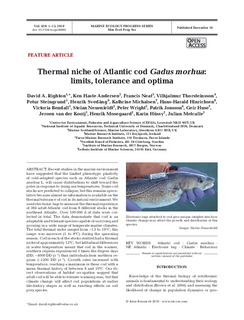Thermal niche of Atlantic cod Gadus morhua: limits, tolerance and optima
Righton, David; Andersen, Ken Haste; Neat, Francis; Thorsteinsson, Vilhjalmur; Steingrund, P.; Svedäng, Henrik; Michalsen, Kathrine; Hinrichsen, Hans-Harald; Bendall, Victoria; Neuenfeldt, Stefan; Wright, Peter; Jonsson, Patrik; Huse, Geir; Kooij, Jeroen van der; Mosegaard, Henrik; Hüssy, Karin; Metcalfe, Julian D.
Journal article, Peer reviewed

View/
Date
2010Metadata
Show full item recordCollections
- Articles [3012]
Original version
http://dx.doi.org/10.3354/meps08889Abstract
Recent studies in the marine environment have suggested that the limited phenotypic plasticity of cold-adapted species such as Atlantic cod Gadus morhua L. will cause distributions to shift toward the poles in response to rising sea temperatures. Some cod stocks are predicted to collapse, but this remains speculative because almost no information is available on the thermal tolerance of cod in its natural environment. We used electronic tags to measure the thermal experience of 384 adult Atlantic cod from 8 different stocks in the northeast Atlantic. Over 100000 d of data were collected in total. The data demonstrate that cod is an adaptable and tolerant species capable of surviving and growing in a wide range of temperate marine climates. The total thermal niche ranged from –1.5 to 19°C; this range
was narrower (1 to 8°C) during the spawning season. Cod in each of the stocks studied had a thermal niche of
approximately 12°C, but latitudinal differences in water temperature meant that cod in the warmer, southern regions
experienced 3 times the degree days (DD; ~4000 DD yr–1) than individuals from northern regions (~1200 DD yr–1). Growth rates increased with temperature, reaching a maximum in
those cod with a mean thermal history of between 8 and 10°C. Our direct observations of habitat occupation suggest that adult cod will be able to tolerate warming seas, but that climate change will affect cod populations at earlier life-history stages as well as exerting effects on cod prey species.